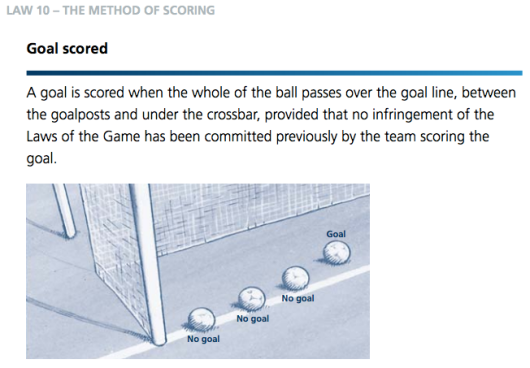The word goal–or should I say, “Goooaaalll!”–is getting millions of fervent football fans on their feet as the World Cup plays on. Off the field, we set them in the office, we set them in the classroom, we set them in life. But, for as much as we are seeking goals in all of our activities, the origin of goal has proven hard to reach.
In the early 1500s, we see evidence of goal‘s sports senses: the Oxford Dictionary of English Etymology cites “terminal point of a race” and, concerning football, “posts through which the ball is driven.” For the latter, FIFA gets a bit more specific:

But why goal?
Goal
We’re not certain, but the best shot we can take is the Middle English gol, a “boundary” or “limit.” It is recorded once in the religious poetry of one, William of Shoreham, around 1315-1320, preserved in a single manuscript in the British Museum:

Some of the manuscript’s spellings seem a bit idiosyncratic, even for a time before the standardization of spelling. And I’m certainly no scholar of Middle English. So forgive me my imperfect, prose approximation of the text:
Though he (God) does not have an end nor therefore a limit,
yet is whole over everything,
without doubt,
Not one part here, another there,
one great body, as it were,
that has gone over all.
This gol has proven elusive. But first, why do we not have any more evidence? The OED suggests that its “rustic” place in sport eluded its place in literature–and therefore early written documentation.
An Old English *gal has been proposed to mean “barrier” or “obstacle” on the basis of gælan, “to hinder.” But there’s no record of this *gal in Old English nor any sound Germanic cognates. Perhaps, others have suggested, that it is a liberal use of gale, a Middle English term for “way.” Old Norse presents geil, a “narrow valley” or “glen,” surviving dialectically as gill in the northerly reaches of the UK, but its connection to goal seems extremely tenuous, at best. French has gaule for “pole,” but semantically, phonologically, and historically this has many holes as an origin for goal. We don’t get to talk about Albanian often, but it is an Indo-European language, and, as far as all my sources are concerned, Wiktionary is alone in citing ngel as a cognate to goal. In Albanian, ngel means “to remain.”
Weekley offers the Latin meta for a parallel sense development. It also meant “boundary” and “limit,” but came to mean a “marker for measuring a lap at a racetrack,” the “conical turning-posts” at either end of the track at an Ancient Roman circus. As with the English goal, this Latin meta went on as a metaphor for a “goal,” and it is easy to see how that which marks something off can become that which we get set on our marks for.
We many not know its “origin,” but its current use–and importance–in (American) English-speaking culture certainly makes up for that. Sports and achievement are active players on the field of our language and our values, and perhaps goal epitomizes the centrality of these metaphors in our culture. But, when we become so accustomed to reaching goals and scoring goals, it can be rallying to be reminded that, as with goal, we don’t know everything, we can’t answer everything. To be reminded of our own boundaries, our own limits.
Wiktionary goes on to suggest Lithuanian gālas (“end”), Latvian gals (“end”) and Old Prussian gallan (“death”) as cognate with Albanian ngel. I found just the one reference expanding on the meaning of Latvian gals and Lithuanian gālas as related to Lithuanian pagaljës and Latvian pagale ((log, stick, firewood)
LikeLike
There is definitely a shared root in the Baltic family with respect to some sort of *gal-. Albanian is evidenced relatively late but has a reputation of absorbing a great deal of vocabulary from other IE languages.
LikeLike
In Ukrainian, “meta” (мета) means goal in the sense of a purpose or objective (in Czech, to an extent as well, but in a somewhat different usage and is very rarely heard). A sports goal, in the sense of a target is “cil” (ціль). If, however, you watch soccer (football, if you prefer), it’s GOOOOOAAAAAAALLLLLLL!!!!! in both languages.
LikeLike